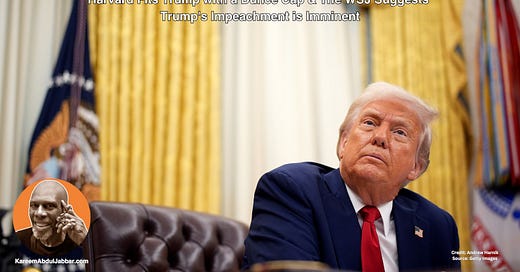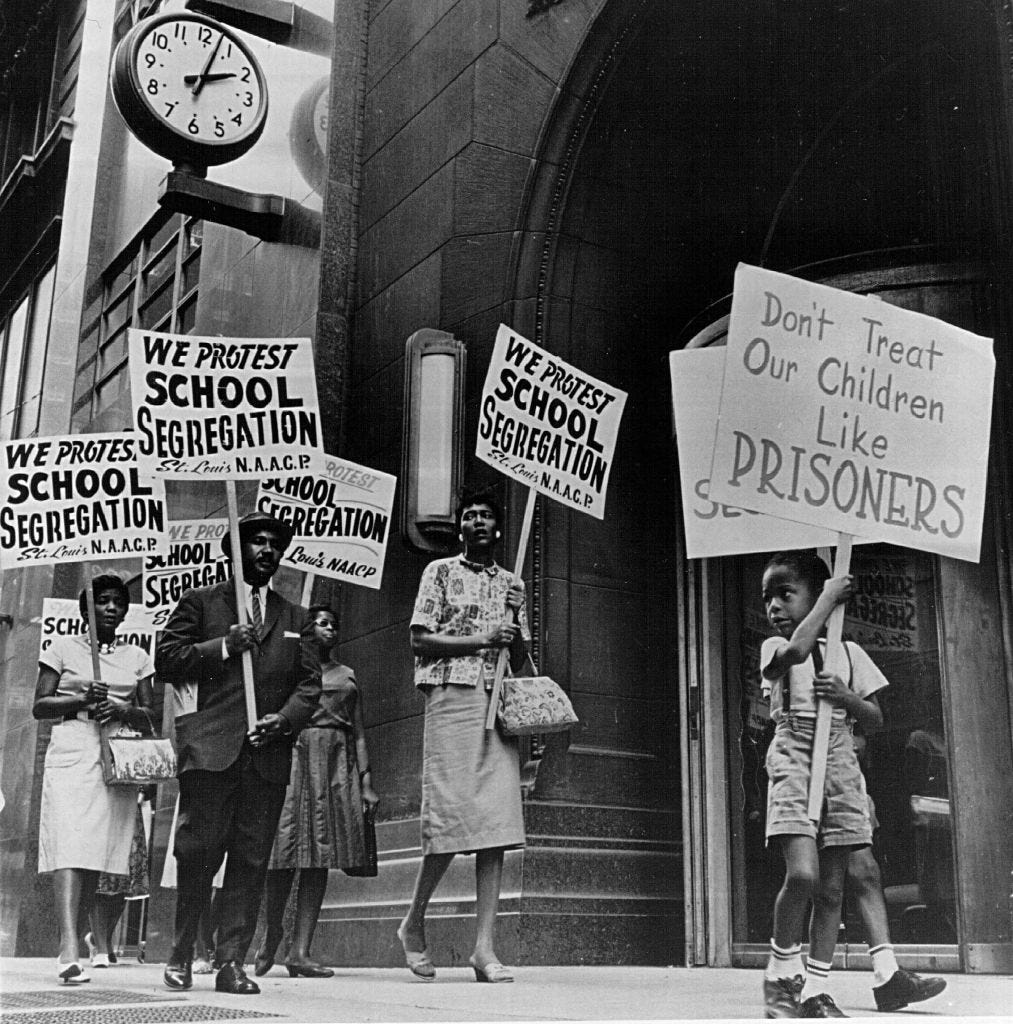Harvard Fits Trump with a Dunce Cap & The WSJ Suggests Trump's Impeachment is Imminent
April 18, 2025
What I’m Discussing Today:
Kareem’s Daily Quote: This country was built on political protest. Why are Trump and the GOP so eager to end free speech?
Harvard Says It Will Not Comply With Trump Administration’s Demands: Trump just got fitted with a dunce cap by Harvard University, one of the few institutions willing to stand on principle.
Is the Impeachment of Trump Inevitable? The Wall Street Journal just suggested it is.
Law firm targeted by Trump sues as five other top firms make deals: Trump’s attempts at punishing law firms that represented clients who sued him just hit one firm with guts, not just a bottom line.
Kareem’s Kvetching Korner: Does Jeff Bezos’ All-Female Crew Actually Set Women Back? The answer is yes.
What I’m Reading: Famous Last Words by Gillian McAllister is one of the best mysteries of the year and On the Edge: An Everyday Doctor’s Adventures in Disaster Medicine by Dr. Andrew Siskind is an endearing celebration of selfless compassion.
Kareem’s Video Break: Watching this fox diving into the snow is mesmerizing.
Kareem’s Sports Moments: The best pickleball player in the world gets a tough lesson.
The Capris Sing “There’s a Moon Out Tonight”: Their one hit is still a doo-wop classic.
Kareem’s Daily Quote: Special Edition
After reading this startling and disturbing article from The Guardian, US intensifies crackdown on peaceful protest under Trump, I decided that today I will quote myself from my forthcoming book, We All Want to Change the World. Since my book is a history of the protest movements in the U.S. from the 1960s to today, it seems appropriate to use an excerpt that addresses the concerns of the article. This is especially topical because of the growing number of anti-Trump protests across the U.S. as well as around the world.
First, context. According to the article, “Forty-one new anti-protest bills across 22 states have been introduced since the start of the year – compared with a full-year total of 52 in 2024 and 26 in 2023…” These bills want to increase criminal punishments for constitutionally protected peaceful protests, particularly anyone speaking out against Israel’s war in Gaza, climate change, or pretty much any criticism against the Trump administration. Just introducing such anti-free speech laws is horrific, but even worse is the vague wording that allows them to arrest anyone for anything the administration deems “disruptive” and send them to prison for 20 years, and then hit them with a $250,000 fine. One bill threatens to take away student loans or aid if a crime is committed during a campus protest, even if it’s simply failing to disperse. These are all of the same mistakes made back in the sixties and seventies that resulted in even bigger and more vocal protests. We certainly can’t accuse our GOP leaders of learning from history—their go-to reaction to criticism is always severe punishment.
That lawmakers care so little about the First Amendment is shocking to me, especially knowing that almost every great social advancement in this country’s history—from civil rights to women voting to the 40-hour week—was the result of protests. The country itself was born out of public protests, as this excerpt discusses. A people who do not cherish their history—good and bad—is a people who have no future.
People tend to look upon protests of the past as historical relics one might uncover in an archeological dig of an ancient civilization. Surely, we are far beyond the necessity for such divisive and primitive tactics in this shiny new age we live in. No injustices happening here that a well-composed tweet or impassioned op-ed won’t resolve. No one needs to march, demonstrate, form encampments, or chant rude slogans. We don’t want or need the conflict, the divisiveness, the instability, the mess. The tsuris.
Sadly, that is what every society ever has said when faced with dissent. Society is like a human body, injustice is a nagging pain we’re trying to ignore so we can pretend nothing is wrong with us, and protests are the doctors diagnosing the cause of the pain and urging us to take the necessary steps before it gets worse. But society is stubborn and afraid, often preferring to hope the pain will go away on its own, even as it spreads.
Americans don’t realize how contentious, divisive, and disruptive all political protests in history have been. The Boston Tea Party is celebrated in schoolroom textbooks as a political protest that helped establish the United States—and turn tea-drinking colonists into the coffee-chugging Americans we are today. Most Americans today just think of the event as a bunch of guys dressed as Mohawk Indians dumping tea into the sea like a frat challenge. Yet, a closer examination of that rowdy, private-property destroying raid reveals a much more conflicted America.
England had just won the French and Indian War, but nine years of fighting had left them in extreme financial trouble. They tried to remedy that by levying taxes on the colonists. The colonists did not appreciate suddenly being taxed without having any say in the matter. Discontent grew and anti-British revolutionaries voiced their opinions, which resulted in Parliament punishing the colonists with even harsher taxes under the Townshend Act in 1767. This led to an angry protest in March of 1770 when British troops fired into the demonstrators killing five and wounding six in what became known as the Boston Massacre.
The outrage from the colonists forced England to rescind the Townshend Act but keep the tea tax. Colonists protested by boycotting tea or smuggling in their own tea. The boycott was effective in that it threatened to bankrupt the East India Company, causing England to pass the Tea Act in 1773, which allowed the company to sell the tea directly to colonists, thus reducing the cost, but asserting the authority of England and a private company to pass laws over the colonists without their input. Many Americans decided they wouldn’t give up their independence in exchange for cheaper tea. Protestors in every colony except Massachusetts forced the tea back to England.
However, Massachusetts Governor Thomas Hutchinson, a lackey for the British, was determined to let the ships land in Boston. Thousands of people met at the Old South Meeting House to compose a resolution demanding the captain of the Dartmouth sail back to England with his cargo of tea. Hutchinson rejected their demand and permitted several ships to dock. On December 16, 1773, between 30 and 130 highly organized men sneaked onto the three tea ships and dumped 90,000 pounds of tea into the harbor. Nothing else was damaged. It was reported that a padlock belonging to the captain of one of the ships was broken, but that some of the raiders returned the next day to replace it. Nothing like the crazed insurrectionists of January 6, 2021 who trashed the Capitol Building and threatened to kill elected officials.
Afterward, many were jubilant. Two of the eventual signers of the Declaration of Independence let their enthusiasm be known. John Hancock wrote: “No one Circumstance could possibly have Taken place more effectually to Unite the Colonies than this Manoevere of the Tea.” John Adams, who would become our second president, crowed the next day, “This is the most magnificent Movement of all. There is a Dignity, a Majesty, a Sublimity, in this last Effort of the Patriots, that I greatly admire.”
Not all our Founding Founders were impressed. Benjamin Franklin and George Washington rebuked the Boston Tea Party. Franklin, who hoped diplomacy would be more beneficial than protests, even suggested that the raiders should repay the East India Company for their losses, which came to about $1.7 million in today’s currency. Washington expressed sympathy for Boston, but feared that the raiders had gone too far. Other colonists also expressed disapproval of the “illegal and unjust” act. They feared that the colonies would all be punished. As the citizens of Freeport, Massachusetts expressed: “[We] fear [it] will bring upon us the Vengeance of an affronted Majesty, and also plunge us in Debt and Misery, when the injured Owners of said Tea shall make their Demand for the Value of the same.”
Predictably, England levied harsher penalties in 1774 called the Intolerable Acts, which removed self-government in Massachusetts and restricted Boston commerce. Ending self-governance enraged the thirteen colonies, which led to more protests, the convening of the First Continental Congress, and the Battles of Lexington and Concord which kicked off the American Revolutionary War.
There you have it. The United States was born out of a protest that was not condoned by a majority. It featured boycotts, crowds of demonstrators, violence against protestors, harsher punishments by authorities, and eventual violence by both sides.





